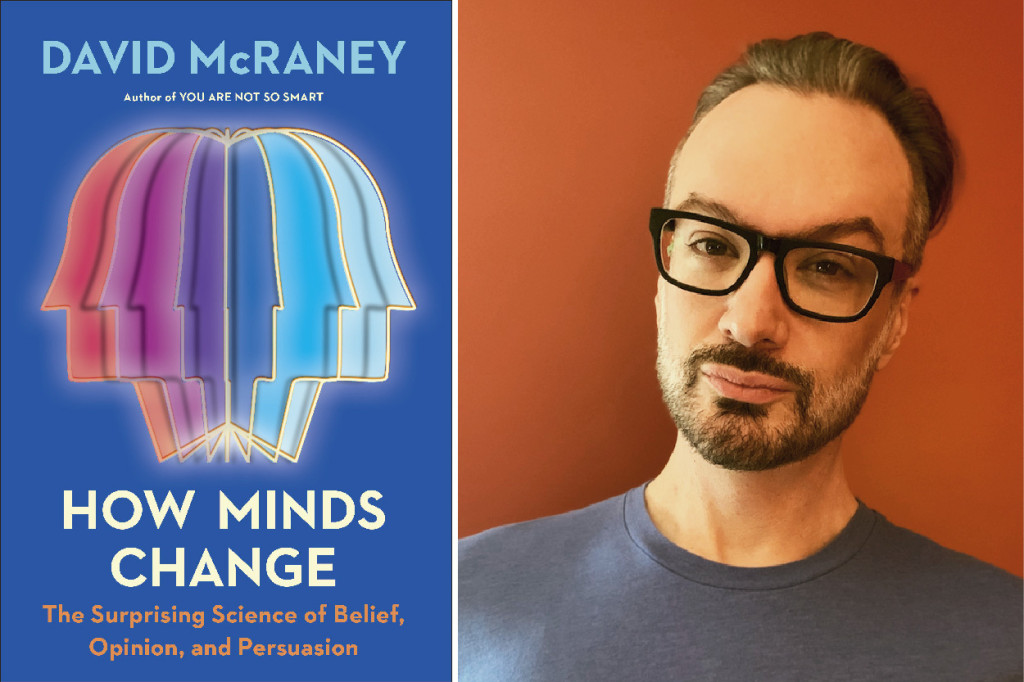‘How Minds Change’ chosen as 2023-24 Go Big Read book

“The ability to change our minds, update our assumptions, and entertain other points of view is one of our greatest strengths, an evolved ability that comes free with every copy of the human brain,” McRaney writes.
Have you ever changed your mind about something you were very sure about? Why do we each believe what we believe, and what leads some of us, some of the time, to change our views? Why do some people change their mind in an instant, and others not at all, no matter the evidence? When are we more open to learning from others, and when less so?
These are some of the questions David McRaney explores in “How Minds Change: The Surprising Science of Belief, Opinion, and Persuasion,” the 2023-24 Go Big Read selection.
Instead of focusing on what people believe, McRaney focuses more on why people believe the way they do and offers surprising evidence from psychology and neuroscience to explain what tends to be persuasive.
“The ability to change our minds, update our assumptions, and entertain other points of view is one of our greatest strengths, an evolved ability that comes free with every copy of the human brain,” McRaney writes. “You will soon see why, to leverage that strength, we must avoid debate and start having conversations.”
“Our brains walk a tightrope, changing our minds carefully based on a variety of motivations and goals,” McRaney writes. “A great conversation requires everyone involved to extend a hand and help others walk that tightrope.”
“This timely book gives us all an opportunity to challenge our own beliefs and assumptions, and to recognize the importance of empathetic listening,” says Chancellor Jennifer L. Mnookin. “McRaney invites us not only to think about how others think, but to think about our own thinking too.”
The book, by delving into the latest research of psychologists and neuroscientists, offers new ways to understand disagreements and to bring about both change and cognitive empathy in our individual lives, at work, at home, and in our personal relationships.
“It encourages those of us who think that we’re right to think again, and to listen,” writes The Guardian.
“Indeed, [McRaney’s] writing is a tonic for those who might scratch their head at how others could be so nonsensical as to distrust vaccines, believe the Earth is flat or subscribe to any other number of conspiracy theories,” says a reviewer in New Scientist. “It helps shift perceptions from the unhelpful attitude of ‘this person is stupid and beyond help’ to ‘this person has a different frame of belief, and they can be encouraged to think more deeply about the issue.’”
A self-described psychology nerd, McRaney started the “You Are Not So Smart” blog in 2009. Its popularity led to a book of the same name that became an international bestseller, available in 18 languages. He also hosts the “You Are Not So Smart” podcast, which features interviews with scientists who study the psychology of reasoning, decision-making, and self-delusion. McRaney has also written “You Are Now Less Dumb” and has had his writing featured in Politico, Salon, Boing Boing, The Atlantic and others.
Go Big Read events connected to the book are expected to include a visit from the author. Planning is underway for how students, faculty and staff will use the book in classrooms and for special events. Copies of the book will be given to first-year students at the Chancellor’s Convocation for New Students and to students using the book in their classes. UW–Madison instructors or event planners interested in using the book can request a print or e-review copy.
The Go Big Read program is an initiative of the Office of the Chancellor. It engages members of the campus community and beyond in a shared, academically focused reading experience.



